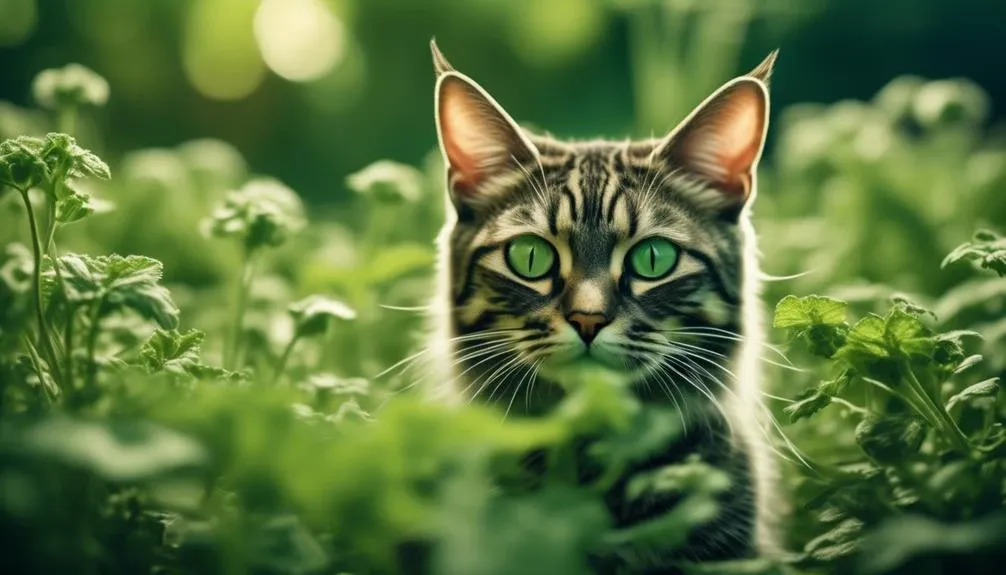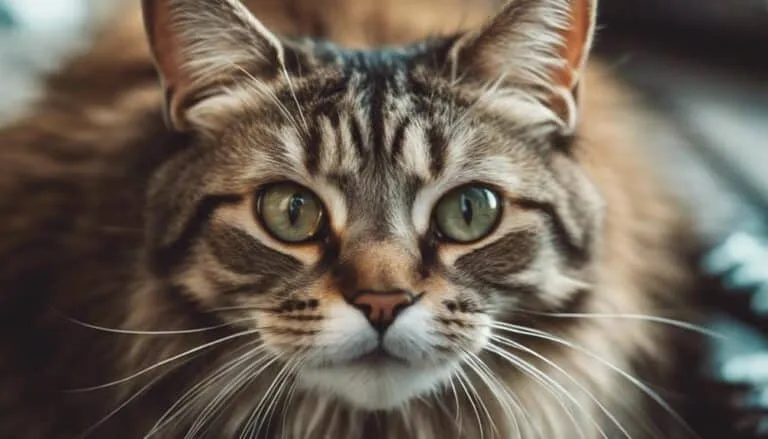The Best Fluffy Pancakes recipe you will fall in love with. Full of tips and tricks to help you make the best pancakes.

Catnip, the controversial herb that captivates our feline friends, has long been a subject of curiosity and intrigue. Its effects on cats have been studied extensively, yet the reasons behind its allure remain somewhat of a mystery.
As cat owners, we have all witnessed the seemingly magical transformation that occurs when our cats encounter this herb. But what exactly is it about catnip that drives cats wild? Is it safe for all cats? And are there alternative options for those who prefer not to use it?
In this discussion, we will explore the fascinating world of catnip, its impact on feline behavior, and the ongoing debates surrounding its use.
Key Takeaways
- Catnip is a mint plant that contains a chemical called nepetalactone, which attracts cats.
- Not all cats are affected by catnip, with only about 50-70% of cats being responsive to it.
- Catnip can elicit various responses in cats, ranging from playfulness and happiness to aggression.
- There are alternatives to catnip, such as silvervine, valerian root, and Tatarian honeysuckle, for cat owners who prefer not to use catnip.
Catnip: An Overview
Catnip, a widely available herb belonging to the mint family, has a significant impact on feline behavior due to its active chemical compound called nepetalactone. Despite its common association with feline euphoria, catnip has additional benefits that make it worth growing at home.
Firstly, growing catnip at home ensures a fresh and potent supply for your furry friend, as store-bought catnip may lose its potency over time. Additionally, growing catnip allows you to control the quality and purity of the herb, ensuring that it is free from pesticides or other harmful substances.
There are, however, some common misconceptions about catnip that need to be addressed.
One of the most prevalent misconceptions is that catnip is addictive for cats. While some cats may exhibit a strong attraction to catnip, it is important to note that catnip is non-addictive and has no harmful effects on feline health.
Another misconception is that all cats are affected by catnip. In reality, only around 50-70% of cats exhibit a response to catnip, with kittens and older cats being less responsive. Understanding these misconceptions can help cat owners make informed decisions about using catnip as a tool for feline enrichment.
Effects of Catnip on Cats
One aspect of catnip that warrants further exploration is its effects on feline behavior and physiology. The key chemical responsible for these effects is nepetalactone, found in the leaves and stems of catnip. When cats come into contact with nepetalactone, it mimics the effect of pheromones, triggering a response in their brains.
However, not all cats exhibit the same response to catnip. The factors that determine a cat's sensitivity to catnip are still not fully understood, but it is estimated that only around 50-70% of cats are affected by it. Additionally, the intensity of the response can vary, with some cats becoming playful and happy, while others may become more aggressive.
The effects of catnip typically last for about 10 minutes, followed by a 30-minute immune period. Further research is needed to fully understand the mechanisms and effects of catnip on cats.
Caring for Cats Without Catnip
To provide alternative forms of stimulation for cats, it is important to explore other methods of enrichment beyond the use of catnip. Engaging activities for cats can include providing plenty of toys to keep them occupied and mentally stimulated. Labyrinth feeders or DIY versions can make mealtime more engaging by requiring the cats to work for their food.
Introducing food puzzles can challenge and entertain cats, stimulating their problem-solving abilities. In addition to these activities, exploring natural alternatives to catnip can also be beneficial. Silvervine, valerian root, and Tatarian honeysuckle are all known to produce similar reactions in cats as catnip. These alternatives can be purchased online or at pet stores, offering options for cat owners who prefer not to use catnip.
Catnip Alternatives
Silvervine, valerian root, and Tatarian honeysuckle are natural alternatives that can elicit similar reactions in cats as catnip. These herbal options offer several benefits for cat owners who prefer not to use catnip.
- Silvervine: This herb, also known as matatabi, contains a compound called actinidine that can stimulate cats and induce playful behavior. It has been shown to be especially effective in cats that are not affected by catnip.
- Valerian root: Valerian root has a calming effect on cats and can help reduce anxiety and stress. It can be used to promote relaxation and improve sleep in cats.
- Tatarian honeysuckle: Similar to catnip, Tatarian honeysuckle contains nepetalactone, which can attract cats and induce a playful response. It is a safe and natural alternative that can provide entertainment for cats.
Exploring different herbal options for cats can offer a variety of benefits, including stimulating playfulness, reducing anxiety, and providing safe alternatives to catnip.
Understanding Catnip's Impact on Feline Behavior
While catnip alternatives like silvervine, valerian root, and Tatarian honeysuckle provide options for cat owners who prefer not to use catnip, understanding the impact of catnip on feline behavior is crucial.
The science behind catnip's effects on cats is still being studied, but it is known that catnip contains a chemical called nepetalactone, which mimics the effect of pheromones and can make cats feel happy or excited. However, only about 50-70% of cats are affected by catnip, and the response can vary. Some cats become playful and happy, while others may become more aggressive.
The effects of catnip typically last for about 10 minutes, followed by a 30-minute immune period. Exploring the potential benefits of catnip for feline enrichment is an important aspect of understanding how to provide the best care for our feline companions.
Conclusion
In conclusion, catnip is a fascinating herb that can have varying effects on cats. While not all cats are responsive to catnip, those that are may experience feelings of happiness or excitement. However, it is important for cat owners to be aware of the potential for increased aggression in some cats.
For those whose cats do not respond to catnip or prefer alternative options, there are various alternatives available. Ongoing scientific research continues to explore the complexities of catnip and its impact on feline behavior.








